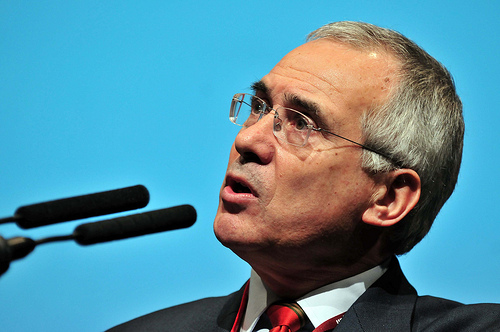 Rep. Upton wants to raise your gas bill.Photo: Mike SchmidCross-posted from the Natural Resources Defense Council.
Rep. Upton wants to raise your gas bill.Photo: Mike SchmidCross-posted from the Natural Resources Defense Council.
Some politicians will say anything to gain from the pain Americans are feeling at the pump.
Anyone watching the news knows that pump prices are rising because world-wide demand is recovering after the recession, oil traders are speculating over turmoil in the Middle East, and U.S. oil companies are only too happy to charge consumers higher prices.
Yet in the fantasyland that passes for political debate in Washington, House Republicans are going all-out to blame high gas prices on — you guessed it — the Environmental Protection Agency. Energy and Commerce Committee Chair Fred Upton (Mich.) is hawking the gas price snake oil as House leadership rams through legislation to block EPA from curbing dangerous carbon pollution.
Thursday, Upton said his energy and power subcommittee “took a strong stand today in support of jobs and against higher gasoline and energy costs by approving H.R. 910, the Energy Tax Prevention Act of 2011.” In the full committee today, Republican members again claimed EPA’s carbon safeguards will raise gas prices.
But facts are stubborn things. The most important thing EPA has done so far on carbon pollution is to set clean car standards. The actual effect of EPA’s clean car standards will be to lower your gasoline bills. The actual effect of Upton’s bill will be to block EPA’s clean car standards and raise your gasoline bills.
Here’s what EPA Administrator Lisa Jackson told Congress last week: “All told, nullifying this part of the Clean Air Act would forfeit many hundreds of millions of barrels of oil savings, at a time when gas prices are rising yet again. I cannot, for the life of me, understand why you would vote to massively increase America’s oil dependence.”
EPA’s clean car standards for 2012-2016 model cars will save so much gasoline that car buyers will save as much as $3,000 over the life of the car, while the country will save 1.8 billion barrels of oil. A quarter of those savings will be lost if EPA’s standards are blocked.
EPA’s clean car standards for 2017-2025 will save even more — as much as another $7,400 per car, and cut national oil dependence by billions of barrels more.
And those calculations were based on gasoline costs starting at $2.61/gallon! At higher gas prices, the savings will be even greater.
The Upton bill would explicitly block EPA from issuing the second set of money-saving clean car standards for 2017-2025. And by repealing the scientific endangerment determination on which the 2012-2016 standards depend, the bill threatens to take down the first set of standards too.
So just what lies behind Fred Upton’s attack on the EPA? Big Oil. The oil industry’s refineries pour 200 million tons of carbon pollution into the air each year — they take second place only to the nation’s power plants. Upton is upset that EPA is doing its job under the Clean Air Act to reduce this dangerous pollution by adding carbon limits to the “performance standards” that oil refineries must meet. His bill would block EPA from acting.
Mr. Upton isn’t telling you that oil refineries have been subject to performance standards like these for other pollutants for decades. The Clean Air Act sensibly requires EPA to update those standards every eight years. When doing so, EPA is obligated by law to set limits for additional pollutants when science shows them to be dangerous. By law, these standards have to be based on the “best demonstrated technology” taking into account costs. In other words, they have to be both achievable and affordable.
Past standards for conventional and toxic emissions from refineries have had barely noticeable effects on the price of gasoline — EPA’s 1995 toxic pollutant standards, for example, added a whopping 1/5th of a cent to the cost of a gallon of gas.
Upton claimed last week, however, that if EPA’s is allowed to limit refineries’ carbon pollution, “You could see gas prices jump another 30 cents or so.” Sounds like an exaggeration, doesn’t it? Especially since EPA hasn’t even drafted the new standards yet.
Well, it turns out that this is just one estimate of what would have happened to gas prices — not tomorrow, but in 10 or 20 years — under the comprehensive climate and energy legislation considered in the previous Congress. In Upton’s upside-down world, “EPA’s regulations are a backdoor attempt by unelected bureaucrats to implement the highly unpopular cap-and-trade legislation that was rejected last year.”
Whatever you may think about last year’s bill, EPA’s steps to carry out the current Clean Air Act aren’t cap-and-trade, and they are far more modest. The bill would have covered the entire transportation sector, including more than 1.5 billion tons of carbon emissions coming each year from cars, trucks, planes, trains, and boats. EPA’s standards for oil refineries are going to address only the 200 million tons coming directly from the refineries themselves — and then only to the extent achievable and affordable.
The big oil companies are being more careful than Upton. They may make broad-brush claims about rising gas prices in testimony and lobbying letters to the Hill, but they’re smart enough not to put in any numbers they know they can’t back up. In his opening statement today, Mr. Upton quoted the claims of an Arkansas small refiner, Lion Oil, that the bill to block EPA is “necessary [PDF] to protect consumers, farmers, and truckers from higher gasoline and diesel fuel prices.” But Lion Oil offers no specifics.
And then there’s Valero, the Texas oil company that bankrolled the unsuccessful Prop 23 in California — and contributed $10,000 to the Upton campaign in the 2007-08 cycle. Valero claims “every credible study” supports its gas price claims, but its letter [PDF] [$ubreq] doesn’t cite a single study or a single figure. (See my colleague Laurie Johnson’s critiques of industry studies here.)
In fact, the oil companies know that, like the clean car standards, many of the steps to curb refineries’ carbon emissions have the potential to save money. Plugging leaks and stopping emissions can pay for themselves in recovered products and lower energy costs.
So if EPA is allowed to do its job, your gasoline bills will go down, not up. EPA’s clean car standards will save you lots of money. And the cost of cleaning up refineries won’t even be noticed, especially amidst the huge fluctuations in oil prices.
But Rep. Upton and his allies have other ideas. If their bill passes, you’ll be paying more at the pump while unrestrained carbon pollution puts your health at risk. Whose side are they on?



